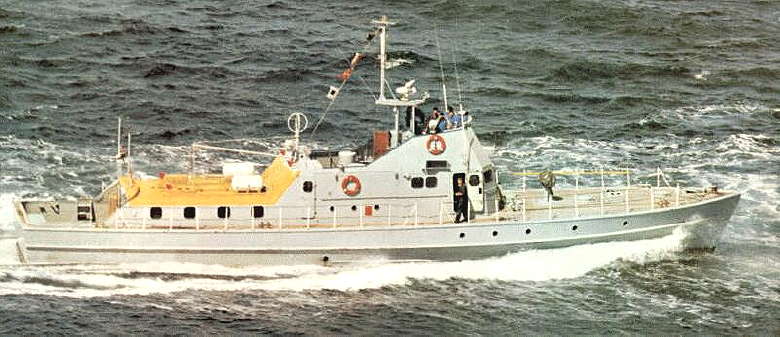

R30 at speed - I am just visible in the well-deck aft.
In 1960 it was recognised that the Miami boats did not have the range to
provide adequate coverage - especially with the closure of crashboat bases
around the coast. Help was sought from the RAF who advised that vessels
be purchased from a German shipyard which had provided the RAF with similar
boats.
The two Krögerwerft boats, R30 and R31 were acquired in 1961 and 1962
respectively. They were built at Krögerwerft's yard at Rendsburg on
the Kiel canal.

A model of the hull shape.
They were of wooden semi-hard chine construction, double planked and sheathed in glass-fibre cloth. They were the direct descendants of the famous E-boats of World War 2 with a hull shape almost exactly similar.

R30 runs trials in the Baltic Sea - she is approaching the harbour at Kiel.
They displaced 87 tonnes and were 30 metres long. These vessels had two
Maybach Mercedes V12 engines of 2240 hp each. Their top
speed was 33 knots. They had an operating range of 1600 nautical miles.
The vessels were equipped with a sickbay and operating table. They also
had a thermal bath unit for reviving hypothermia sufferers.
The seakeeping capabilities of these boats was magnificent and they had the
ability to maintain a high speed in very bad weather.

R30 on the slip at Langebaan.
They were fitted with Decca 707 true motion radars, Marconi HF and DF radios,
Anschutz Gyro compasses and auto-pilots. They also carried VHF and UHF radios
to enable communications with the Shackletons of 35 squadron. They were
equipped with SARAH (Search and Rescue and Homing) equipment to home in
on SARBE beacons carried as lifeboat equipment.
The design crew was 12 - but they often had to sail with fewer men than this.
The first vessel, R30, was launched by the daughter of the MD of Krögerwerft
and was unofficially named after her - Brigitte. She arrived in Cape Town,
aboard a freighter, in 1961. She was lost in 1988 when she was run aground
on Tooth Rock, just off Saldanha, at high speed.

R30 in happier days with the SAN.
Her sister, R31, turned up a year later and has just (1997) been retired
by the SAN after 35 years service.

P1551 taking part in the Navy 75th Birthday celebrations.

R31 - alias P1551 - retires after 35 years of service with the SAAF and SAN.

R30 & R31 lie at the jetty at Langebaan.
Back .